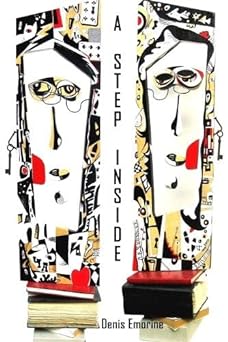
Denis Emorine’s new collection A Step Inside attacks, blasts, compels, disturbs, and ultimately enchants us with the (quite literal) power of language.
The first section’s poems evoke the psychological and emotional toll the creative process can take, along with its wonderment. We begin with an anecdote where the speaker stabs the disembodied voice of his creative muse when it asks him to write about the woman he loves, then finds blood on his pillow as he has destroyed part of himself (Metaphor). In another memorable piece, the letters of the alphabet literally assault a protagonist (A trap). Other pieces speak to acknowledging inspirations and aspirations one cannot fully reach (Nocturnal), to the havoc creative obsessions can wreak on one’s personal life (Disobedience), to the rejection an artist can face at the hands of the public (Fever) to the struggle to be able to create at all (Face to Face) to the solidarity creative writers can feel for each other (In Solidarity).
Yet, even with these tough-minded renditions of mental turmoil, the beauty, wonder, and ecstasy of the creative process still come through in A Step Inside. Emorine draws upon many of the traditional positive literary metaphors for inspiration: muses, stars, dreams, gardens at night, even in some of his most violent poems. Also, writer protagonists encounter magical moments others miss, including a lively visit with Kafka, climbing up to one’s flat.
The second section, From My Window, consists of longer narratives blurring the lines between artistic performance and seduction. In one, a former live theater tech invites his female neighbor to dress for him in the robes of Greek goddesses. At first reluctant, she embraces the role at the end and chooses to dress as Venus before they consummate their relationship (The Mural). Another story shifts the gender roles, with a male artist undressing in tune with the rise and fall of music and another man watching and discovering his passion for him (The Virgin and the Shadow). In another piece, an old and sick man who comes close to cheating on his wife at a literary conference finds himself instead taking comfort in the memory of her healing touch (Irina) and the final piece, Twenty-One Hundred Hours, involves a chaste intellectual friendship that develops between an older professor and a sex worker who turns out to be a literary student.
This new collection from Denis Emorine explores the different forms creative inspiration can take and the various ways it can shape and revamp our lives. Whether we are alone staring at a blank page in our bedrooms or encountering others at a symposium or theater, we can find ourselves wrestling with the angels of our art.
